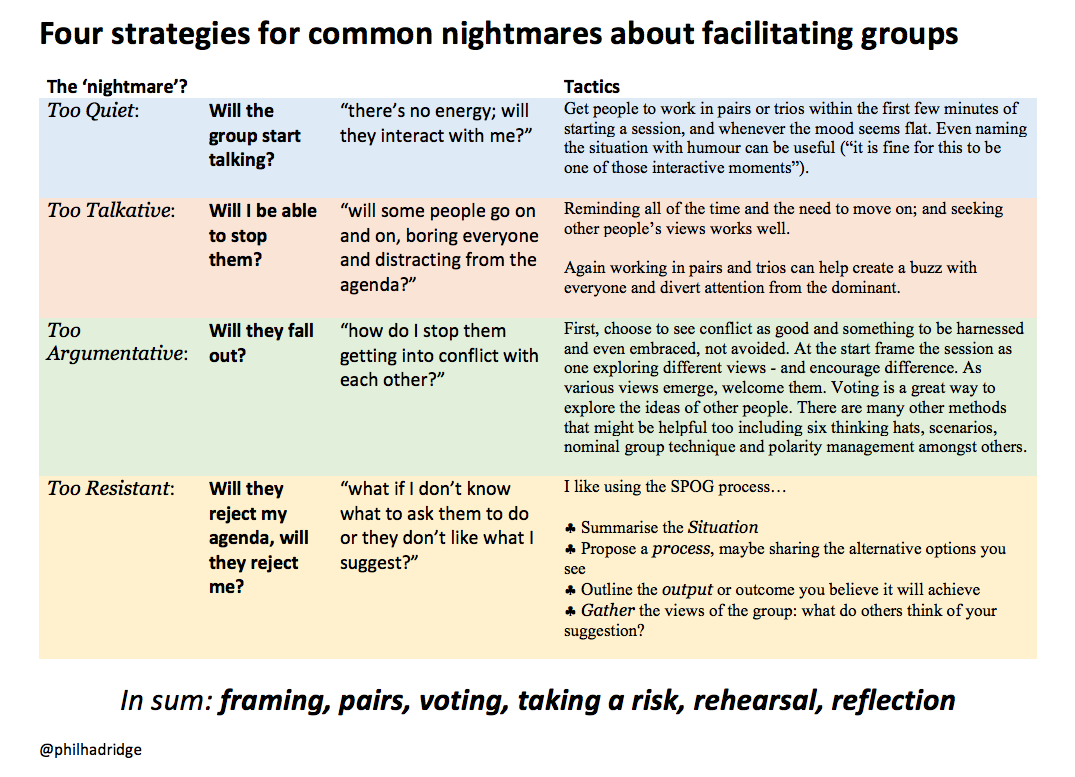Home > Business Briefing > July 2019
From facilitation nightmares to 'no cares'

In my one-to-one coaching, I often use a framework adapted from scenario planning. I get clients to describe 4 futures they think they might encounter: the Dream, the Disaster, the Default and the Do-able.
When coaching someone to develop their facilitation* skills and repertoire, I find that the fear of the disaster scenario figures most prominently. The worry of things going horribly wrong looms large. My online facilitation skills assessment has a tenth category that surfaces these fears. This 'facilitation nightmares' section regularly reveals the lowest scores.
Common nightmares about working with groups
So what are these nightmares? The same ones come up time and time again and include these four:
- Will the group start talking – "there’s no energy, will they interact with me?"
- Will I be able to stop them – "will some people go on and on, boring everyone and distracting the process?"
- Will they fall out – "how do I stop them getting into conflict with each other?"
- Will they reject my agenda, will they reject me – "what if I don’t know what to ask them to do or they don’t like what I suggest?"
Which do you worry about the most? Do you know what would you do for each?
Tried and trusted tactics for facilitators of groups
In my facilitation training, we explore lots of top tips for these. Briefly, a few of my favourite tactics are:
- Too Quiet: Get people to work in pairs or trios within the first few minutes of starting – and whenever the mood seems flat. Even naming the situation with humour can be useful ("it is fine for this to be one of those interactive moments").
- Too Talkative: I find that humour, reminding all of the time and seeking other peoples views works. Again working in pairs and trios can help create a buzz from all and divert attention from the dominant,
- Too Argumentative: First, choose to see conflict as good and something to be harnessed and embraced even, not avoided. At the start frame the day as about exploring different views - and encourage difference. As various views emerge welcome them. Voting is great to explore the ideas of other people. This article explores the full range of analogue and digital ways to canvas the views of a group. There are many other methods that might be helpful too: tools like the six thinking hats, positioning Thomas-Kilmann grid, scenarios, hexagon mapping, iceberg thinking, polarity management, dilemma resolution, the idenk agree/differ process...
- Too Resistant: I like using the SPOG process...
SPOG?
The ‘SPOG’ method is helpful when you experience sustained pushback to your suggestions:
- Summarise the Situation
- Propose a process, maybe sharing the alternative options you see too
- Outline the output or outcome you believe it will achieve
- Gather the views of the group: what do others think of your suggestion? Check what they think might be useful to do…
Prevention is better than cure...
So, what can be done to avoid nightmares in the first place?
Rehearsal of a session is important and regularly underused. It is the second D of the 4Ds of Facilitation (design, dry run, do it, debrief)…and one of the design dozen too.
But, what can be done, in the heat of the moment? As you get ready to use the SPOG process:
- First, think about what is going on – what are your hypotheses for what is happening under the surface (see the iceberg or Deep Think model here – maybe even working this explicitly with the group as indicated in iii above, drawing on all your prior experience and training).
- Explore your options: maybe using the Heron framework and recalling the ideas from one of the best facilitation books.
- Have a go!
- Then reflect: what went well, what would you have done differently, what are you curious about (what do you think might have been going on), what will you do next? You can journal this process with a pen and paper in a book to keep or type in an e-file?
The more you do this, the easier it gets. Building your capacity to reflect regularly after a session increases your chance of seeing alternatives and options ‘in the moment’, next time.
So is it possible to go from anticipated nightmares to 'no cares'? Well not totally, but less worry is certainly possible.

*This post is part of my 'Facilitating Value' blog series.
Phil
phil.hadridge@idenk.com

